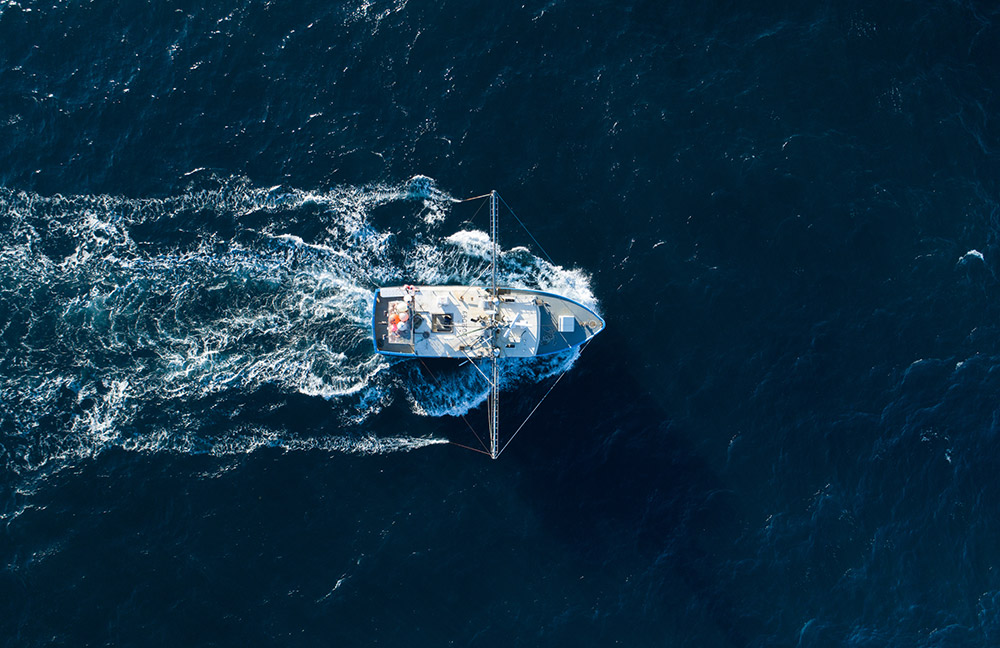
開普梅縣境內水系密布,陸地不時會被特拉華灣和大西洋的潮水所淹沒。
燈塔歷史學家、漏斗蛋糕大師、沖浪教練、酒店管家、海岸警衛隊成員、鯖魚加工商、海洋生物學家、酒保和賣酒女郎等各色人群就在這里傍水而居。每到夏天,游客就會像潮水一樣涌入,就像淹沒陸地、貫通大洋和海灣的潮水一樣,從不缺席。
在海邊做海鮮生意的24歲的薩拉·布萊特是本地人。她做生意的地方是一個名叫瓦爾德伍德的小鎮,這里以喧鬧的木板路、寬闊的白色海灘和中世紀風格的霓虹燈而聞名。
她和父母住在開普梅法院附近,家中建有一個長滿海草的池塘,池塘的年紀比她還大,而建造者則是她的父親——商業漁民比爾。
如果你一年前告訴薩拉,2020年,52%的30歲以下的“新冠難民”將因疫情返回故鄉,而她也會成為其中一員,回去與家人一起在海鮮行業工作,她會笑著說不可能,并告訴你“我的生活在科羅拉多州。”
薩拉和她的三個兄弟姐妹——26歲的泰斯、23歲的薩姆和20歲的威爾都是在故鄉人工修建和潮汐沖刷形成的水道上長大的,以挖小簾蛤、抓螃蟹為樂,還會跟比爾一起出海捕魚,幫助父親比爾和母親米歇爾經營自家備受歡迎的碼頭食品卡車——Hooked Up Seafood。
但高山和積雪把布萊特家的孩子都吸引到了西部。大學畢業后,泰斯在紐約待了一年,隨后搬到丹佛,在一家擁有48個品牌的軟件公司從事市場營銷工作。
薩拉也跟著她的腳步走出了故鄉,前往科羅拉多州發展,但卻對投身大企業保持謹慎態度。
薩拉說:“我有很多朋友雖然找到了工作,但卻并不開心,這也讓我開始恐慌了起來。從小到大,我們一直被教育說要勇于冒險,生命應該多姿多彩,不應在無聊中虛度。”
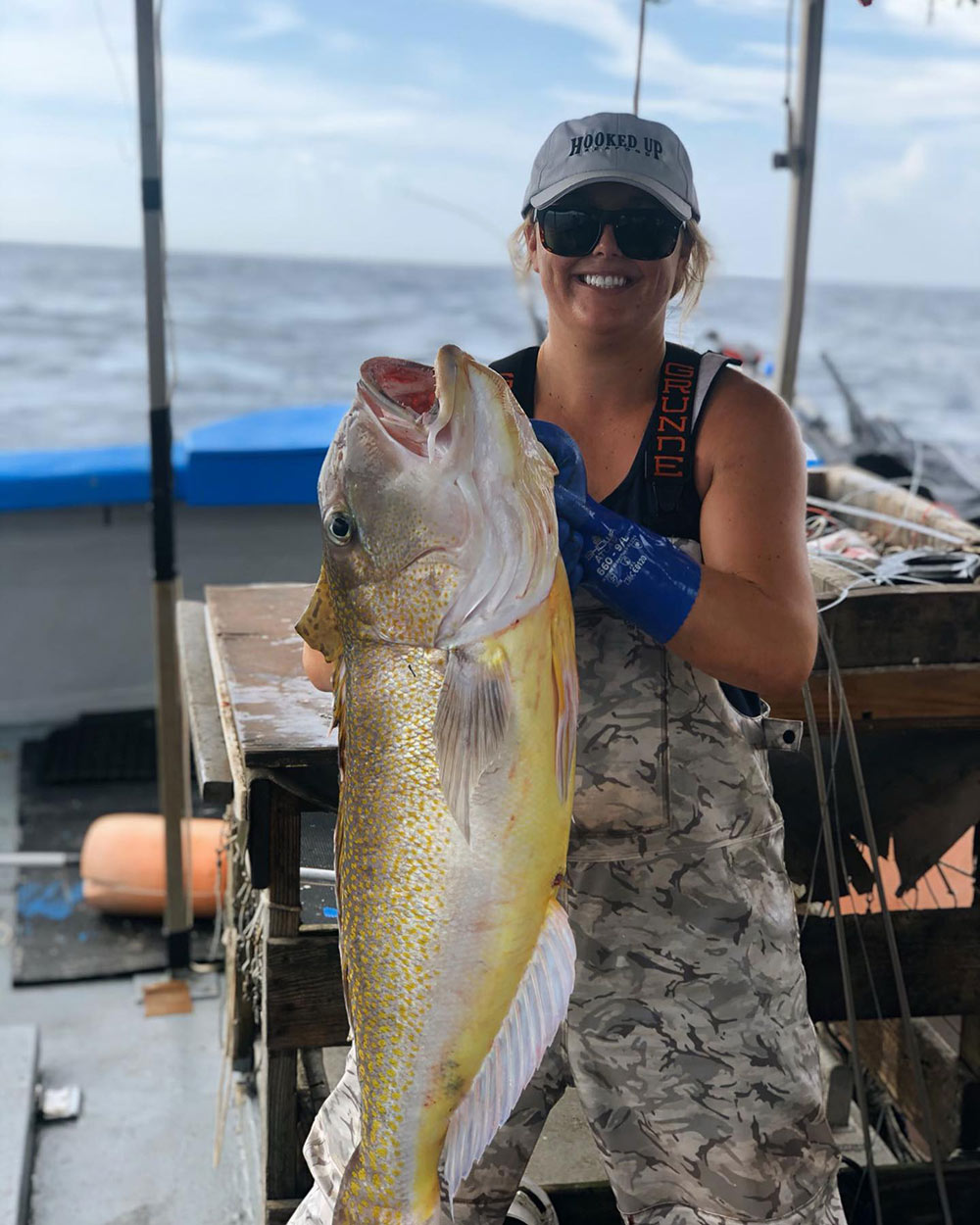
在科羅拉多尋覓了一個月之后,她最終在阿斯彭一家小酒館找了一份兼職酒保的工作,因為鎮上只有這家酒館到午夜之前都會提供餐食,所以備受兼職人群的歡迎。
她白天滑雪,晚上賺錢,每天從酒館出來時口袋里都裝滿了小費,可達800到1000美元之多。酒保和服務生的工作她都做,自己布置房間,不放過每一次加班的機會:對于布萊特家的人來說,做得比別人多、比別人好,幾乎可以說是默認配置。
但疫情爆發后,阿斯彭的旅游業迅速崩盤。
因為一直有儲蓄習慣,所以薩拉得以堅持到了八月,她表示,“我當時每天都在徒步旅行,做著各種各樣有意思的事情,但總覺得沒有滿足感,(除了管理2000英里外的Hooked Up Seafood的社交媒體)有時好像自己的大腦被荒廢了一樣。于是我就開始思考如何才能改進Hooked Up,實現業務升級。”
也就是在這時,Hooked Up Marketplace開始成型,并最終吸引她回到故鄉。
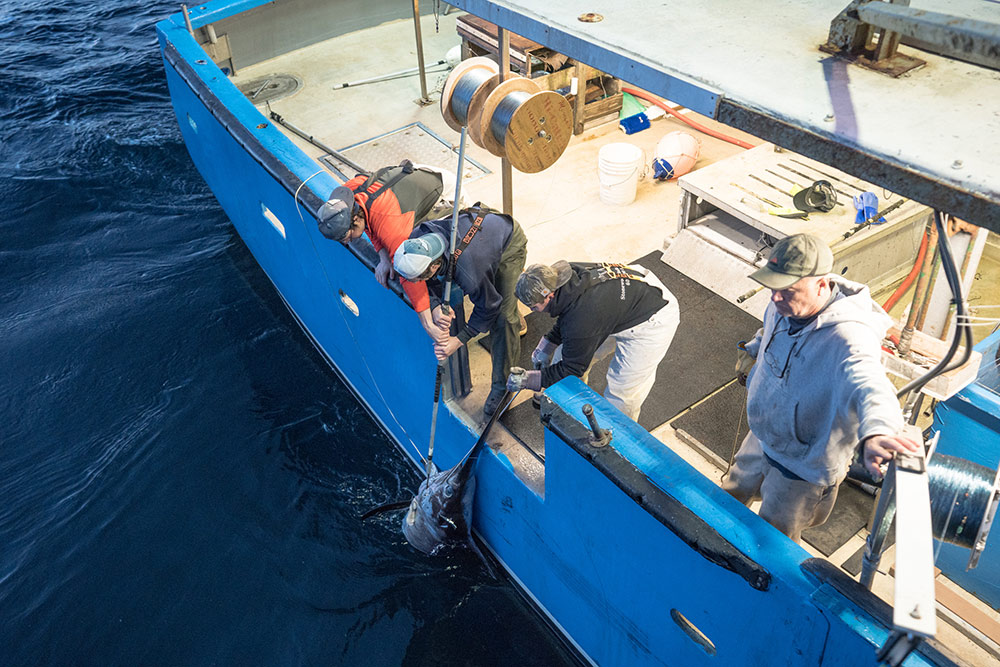
當孩子們還小的時候,比爾經常出海捕魚,據其介紹,“一年大概有150天是在海上”。
某個星期天,他從新英格蘭捕魚回來,把全家人聚在桌旁,提出了創業開家餐館的想法。確切的說也不是一家傳統意義上的餐館,而是餐車廚房。餐車位于理查德森海峽碼頭,近旁布置些野餐桌,處理漁獲的地方就在幾英尺外,食材的新鮮度肉眼可見。
“孩子們馬上就喜歡上了這項工作。”
母親米歇爾是新聞專業出身,而父親比爾是頂級家庭廚師,2010年,兩人一同創辦了Hooked Up Seafood,并迅速打響了名頭。
開普梅三面環水,且為東海岸第二大商業漁港所在地。他們堅持使用當地水產,并極為注重食材的新鮮度,與周邊許多同行形成了鮮明對比。
雖然特拉華灣牡蠣和開普梅扇貝在鎮上的菜單上相當常見,但消暑游客在當地戶外甲板和海邊酒館所享用的水產往往是廉價的冷凍進口貨。人們注意到了這種差異,而Hooked Up也憑借著良好的口碑逐漸發展了起來。
“但我們做這件事從來都不是為了賺錢,”比爾說,“更多的是希望能和孩子們一起,真正度過一些高質量的時光。”
作為高中生,看著自己的朋友在海灘上玩水上摩托,泰斯、薩拉、薩姆和威爾可能不會把在32攝氏度的天氣里駕駛輪船、剝玉米穗或收拾一盤盤的螃蟹碎塊看作是高質量的家庭時光。
但他們的父母強調,“重點不在于你個人,而在于我們的整個團隊。在繁忙的假日周末,一切都有條不紊地運轉,大家各司其職,正是我們團隊表現優異的真正原因。陪伴家人,看著家人解決問題、協同工作,是我做過的最有價值的事情之一。”
無論如何,經營Hooked Up都是件非常辛苦的工作,而隨著孩子們走上他們各自的道路,經營也變得越發困難:泰斯和薩拉去了科羅拉多,薩姆去年5月畢業拿到機械工程學位之后,在麋鹿狩獵季到俄勒岡找了一份裝配工的工作;而威爾,作為優秀高中畢業生、羅文大學大二學生,則想要四處旅行。
薩拉說:“隨著我們一個個離開Hooked Up,爸爸也開始招進其它員工,但他會覺得‘這不是我想要的狀態。我想和家人一起工作,每天都能跟大家見面,跟其他孩子一起工作沒法做到這一點。’”
加上又碰上了新冠疫情,比爾和米歇爾甚至覺得Hooked Up的生意可能會在2020年夏天拉下帷幕。
“薩拉和我一直都在說,這份生意對我們家而言具有特別意義,”泰斯說,“我們不想讓它消失。我們不僅可以賣蟹餅三明治和新鮮魚肉拼盤,還可以推出一些新業務,在賺錢的同時對社區發揮更大的作用。”
薩拉匆匆制定了商業計劃,勞動節剛過就搬回了家。按照規劃,Hooked Up Marketplace將單獨負責零售業務,并重點介紹水產的相關信息,比如產地信息和烹飪方法。
薩拉、泰斯和他們34歲的表親馬特·戴利,一位來自費城外的供應鏈專家,將擔任領導職位。新公司將利用Hooked Up的忠實客戶,通過快閃店、農貿市場和訂貨等形式,將季節性客戶轉化為全年客戶。新公司將與比爾的漁船進行合作,但在經營上則是作為單獨的實體。
泰斯說,“我爸一直說‘你們隨便做,我不想摻和進來,’這挺有意思的,因為大家都知道他想跟我們一塊做。他希望用這種方式,讓我們把這個工作做成我們自己的項目。”
準備停當之后,他們現在需要做的就是拿出一件標志性產品了。
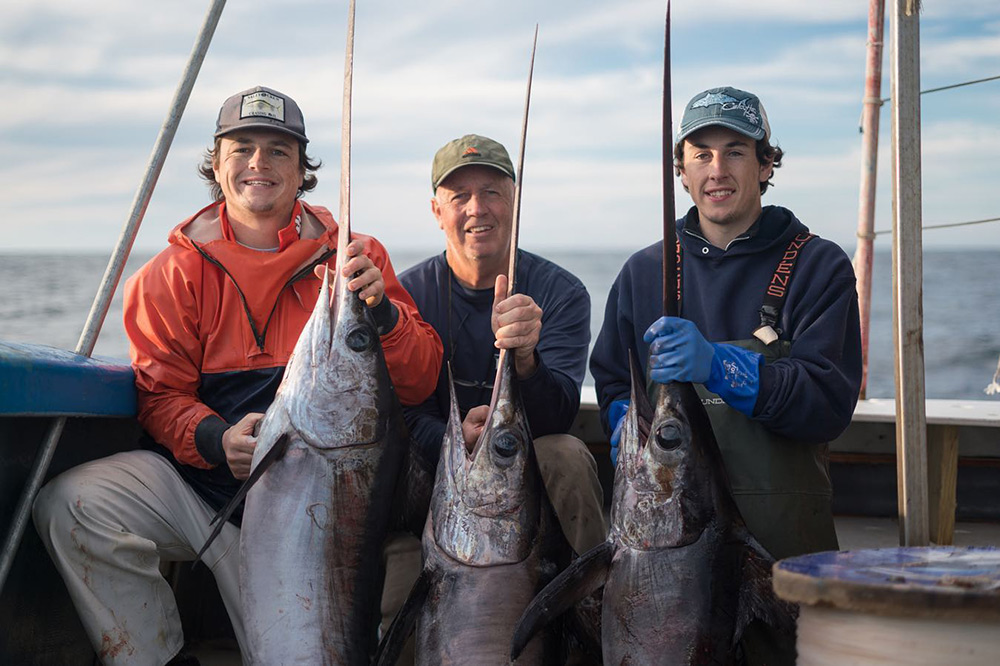
捕撈劍魚從來都不是一件容易的事情,但在溫暖的表層海水處還是相對容易一些。但由于上層海水的溫度在夏季可達到27攝氏度之高,哪怕剛剛捕獲,漁獲其實已經錯過了最佳溫度。
考慮到大型船只經常要在海上航行多日,即使在船上進行速凍,漁獲也很容易腐敗變質。
“人們不喜歡劍魚,是因為他們從來沒有吃過好的劍魚。一般情況下,劍魚可能都要捕獲兩周之后,才能送上消費者的餐桌。” 比爾說。
雖然也捕撈大眼金槍魚、鲯鰍魚和其他熱門水產,但魷魚一直是比爾的主要目標,他也利用自己20年來捕撈魷魚積累的專業知識,解決了劍魚質量不佳的問題。
魷魚通常生活在遠離大陸架且寒冷、黑暗的貧乏水域,在紐約和哈特拉斯角之間,洋底直降1800英尺。但每天早上,魷魚就會像郊區居民到市中心上班一樣,游到繁忙溫暖的表層海面,以依賴陽光的浮游動物為食。
螳螂捕蟬,黃雀在后。
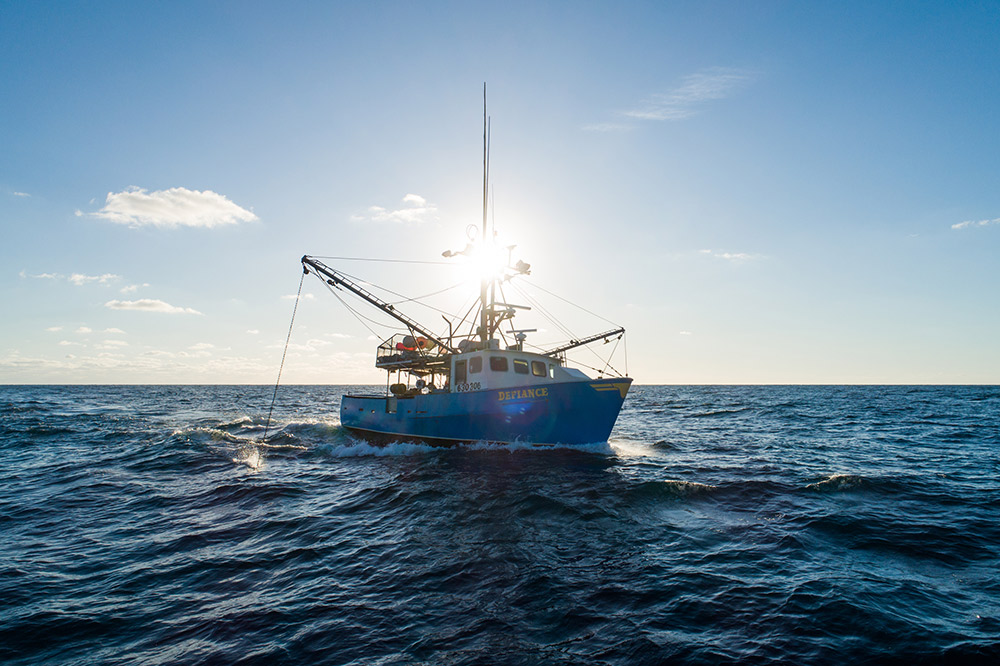
比爾想到,如果放上1200英尺到1500英尺的長線,在劍魚開始上浮時,而不是在水面上捕撈劍魚,質量會不會更好呢?
于是他便開始了測試,經過幾次成功嘗試之后,“我們意識到,在深海捕魚不僅沒有副漁獲的干擾,而且漁獲撈出水面時核心溫度僅為10攝氏度,如同在冰箱中冷藏一般。”而比爾和他的船員則會全程確保漁獲保持低溫,就像“銀子彈”啤酒一樣。
比爾意識到,這種優質劍魚排不僅可以供米歇爾在Hooked Up Seafood烹飪做菜,還可以成為他的拳頭產品——質地優良、口味上佳、長期天然保鮮。
“我是東海岸第一個想把這種產品推向市場的人。”他給其起了一個朗朗上口的名字,“深水劍魚(Deep Drop Swordfish)”,并委托薩拉、泰斯和馬特通過Deep Drop Swordfish宣傳產品故事,提高品牌認知度。
由于曾在迪法恩斯號上親手將健碩的劍魚拖上光滑的木質甲板,薩拉成了公司理想的品牌大使。
她說:“當我告訴別人我去捕撈劍魚時,他們的反應通常是‘你跟他一塊去?你喜歡出海捕魚么?’商業漁業中,親手捕魚的女性并不多。”(在美國最大的漁業州阿拉斯加州,只有15%捕魚許可證的持有者是女性,并且漁業普遍存在性騷擾問題。)
“社會在男女所能從事的工作上劃分了界限,但我們的父母(在撫養我們的過程中)并未對兒女區別對待,而是給了我們同樣的空間。”
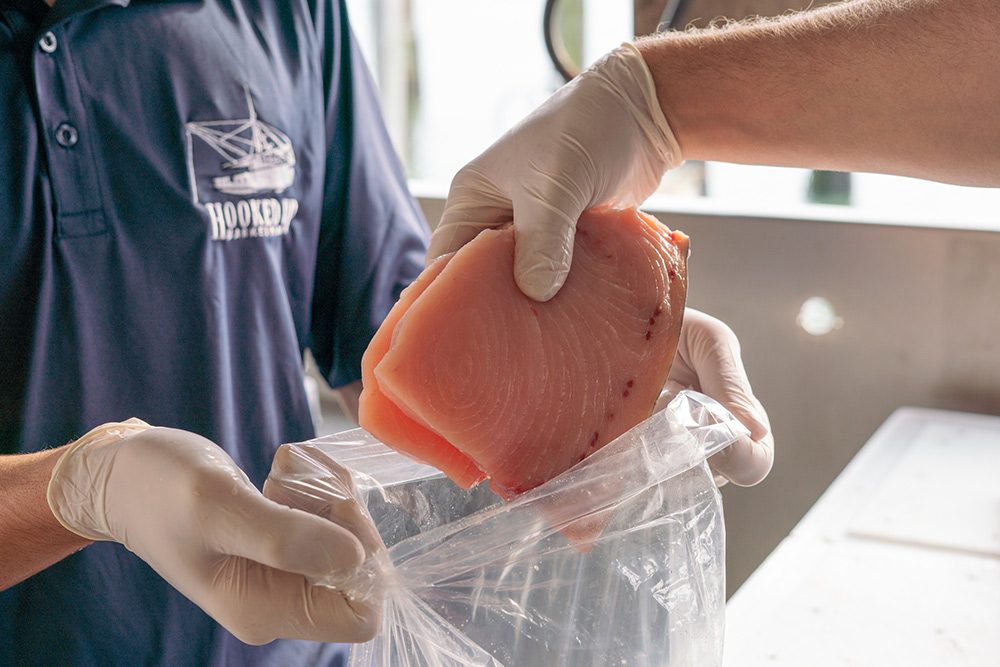
9月18日,薩拉如常在Hooked Up的Instagram上發布季末告別文章,區別只在于,本次告別文章中還包括對Hooked Up Marketplace的介紹。
五個星期后,她發出了一張泰斯設計的宣傳圖,上面是“深海劍魚”光彩奪目的魚排產品。
“想要找到可以在家烹飪的令人驚嘆的高品質海鮮嗎?不用再找了,我們就是您的最佳選擇,首次官方快閃銷售活動即將開啟!比爾船長將駕駛迪法恩斯號漁船,給您帶來大西洋海岸最新鮮的‘深海劍魚’,本地優品,不容錯過!”
泰斯說:“開始時我們并沒有多大的野心,但是市場非常火爆。”
去年秋季三次快閃銷售活動的銷售額都實現了100%的增長。由于泰斯目前還在丹佛,薩拉和馬特就讓威爾回來給家里幫忙。
威爾告訴薩拉:“別把我說的話告訴媽媽,但我真不明白為什么我還要去學校學工程學,我知道自己想干什么,我想跟你一塊做生意。”
薩拉對此并不意外。“注冊公司時,我把大家的名字都寫上了,我很清楚,這兩年或者未來的每一天,大家都會加入到這項事業之中。如果把大家的技能整合到一起,我們將會成為一支強大的團隊。”(財富中文網)
譯者:梁宇
審校:夏林
開普梅縣境內水系密布,陸地不時會被特拉華灣和大西洋的潮水所淹沒。
燈塔歷史學家、漏斗蛋糕大師、沖浪教練、酒店管家、海岸警衛隊成員、鯖魚加工商、海洋生物學家、酒保和賣酒女郎等各色人群就在這里傍水而居。每到夏天,游客就會像潮水一樣涌入,就像淹沒陸地、貫通大洋和海灣的潮水一樣,從不缺席。
在海邊做海鮮生意的24歲的薩拉·布萊特是本地人。她做生意的地方是一個名叫瓦爾德伍德的小鎮,這里以喧鬧的木板路、寬闊的白色海灘和中世紀風格的霓虹燈而聞名。
她和父母住在開普梅法院附近,家中建有一個長滿海草的池塘,池塘的年紀比她還大,而建造者則是她的父親——商業漁民比爾。
如果你一年前告訴薩拉,2020年,52%的30歲以下的“新冠難民”將因疫情返回故鄉,而她也會成為其中一員,回去與家人一起在海鮮行業工作,她會笑著說不可能,并告訴你“我的生活在科羅拉多州。”
薩拉和她的三個兄弟姐妹——26歲的泰斯、23歲的薩姆和20歲的威爾都是在故鄉人工修建和潮汐沖刷形成的水道上長大的,以挖小簾蛤、抓螃蟹為樂,還會跟比爾一起出海捕魚,幫助父親比爾和母親米歇爾經營自家備受歡迎的碼頭食品卡車——Hooked Up Seafood。
但高山和積雪把布萊特家的孩子都吸引到了西部。大學畢業后,泰斯在紐約待了一年,隨后搬到丹佛,在一家擁有48個品牌的軟件公司從事市場營銷工作。
薩拉也跟著她的腳步走出了故鄉,前往科羅拉多州發展,但卻對投身大企業保持謹慎態度。
薩拉說:“我有很多朋友雖然找到了工作,但卻并不開心,這也讓我開始恐慌了起來。從小到大,我們一直被教育說要勇于冒險,生命應該多姿多彩,不應在無聊中虛度。”
在科羅拉多尋覓了一個月之后,她最終在阿斯彭一家小酒館找了一份兼職酒保的工作,因為鎮上只有這家酒館到午夜之前都會提供餐食,所以備受兼職人群的歡迎。
她白天滑雪,晚上賺錢,每天從酒館出來時口袋里都裝滿了小費,可達800到1000美元之多。酒保和服務生的工作她都做,自己布置房間,不放過每一次加班的機會:對于布萊特家的人來說,做得比別人多、比別人好,幾乎可以說是默認配置。
但疫情爆發后,阿斯彭的旅游業迅速崩盤。
因為一直有儲蓄習慣,所以薩拉得以堅持到了八月,她表示,“我當時每天都在徒步旅行,做著各種各樣有意思的事情,但總覺得沒有滿足感,(除了管理2000英里外的Hooked Up Seafood的社交媒體)有時好像自己的大腦被荒廢了一樣。于是我就開始思考如何才能改進Hooked Up,實現業務升級。”
也就是在這時,Hooked Up Marketplace開始成型,并最終吸引她回到故鄉。
當孩子們還小的時候,比爾經常出海捕魚,據其介紹,“一年大概有150天是在海上”。
某個星期天,他從新英格蘭捕魚回來,把全家人聚在桌旁,提出了創業開家餐館的想法。確切的說也不是一家傳統意義上的餐館,而是餐車廚房。餐車位于理查德森海峽碼頭,近旁布置些野餐桌,處理漁獲的地方就在幾英尺外,食材的新鮮度肉眼可見。
“孩子們馬上就喜歡上了這項工作。”
母親米歇爾是新聞專業出身,而父親比爾是頂級家庭廚師,2010年,兩人一同創辦了Hooked Up Seafood,并迅速打響了名頭。
開普梅三面環水,且為東海岸第二大商業漁港所在地。他們堅持使用當地水產,并極為注重食材的新鮮度,與周邊許多同行形成了鮮明對比。
雖然特拉華灣牡蠣和開普梅扇貝在鎮上的菜單上相當常見,但消暑游客在當地戶外甲板和海邊酒館所享用的水產往往是廉價的冷凍進口貨。人們注意到了這種差異,而Hooked Up也憑借著良好的口碑逐漸發展了起來。
“但我們做這件事從來都不是為了賺錢,”比爾說,“更多的是希望能和孩子們一起,真正度過一些高質量的時光。”
作為高中生,看著自己的朋友在海灘上玩水上摩托,泰斯、薩拉、薩姆和威爾可能不會把在32攝氏度的天氣里駕駛輪船、剝玉米穗或收拾一盤盤的螃蟹碎塊看作是高質量的家庭時光。
但他們的父母強調,“重點不在于你個人,而在于我們的整個團隊。在繁忙的假日周末,一切都有條不紊地運轉,大家各司其職,正是我們團隊表現優異的真正原因。陪伴家人,看著家人解決問題、協同工作,是我做過的最有價值的事情之一。”
無論如何,經營Hooked Up都是件非常辛苦的工作,而隨著孩子們走上他們各自的道路,經營也變得越發困難:泰斯和薩拉去了科羅拉多,薩姆去年5月畢業拿到機械工程學位之后,在麋鹿狩獵季到俄勒岡找了一份裝配工的工作;而威爾,作為優秀高中畢業生、羅文大學大二學生,則想要四處旅行。
薩拉說:“隨著我們一個個離開Hooked Up,爸爸也開始招進其它員工,但他會覺得‘這不是我想要的狀態。我想和家人一起工作,每天都能跟大家見面,跟其他孩子一起工作沒法做到這一點。’”
加上又碰上了新冠疫情,比爾和米歇爾甚至覺得Hooked Up的生意可能會在2020年夏天拉下帷幕。
“薩拉和我一直都在說,這份生意對我們家而言具有特別意義,”泰斯說,“我們不想讓它消失。我們不僅可以賣蟹餅三明治和新鮮魚肉拼盤,還可以推出一些新業務,在賺錢的同時對社區發揮更大的作用。”
薩拉匆匆制定了商業計劃,勞動節剛過就搬回了家。按照規劃,Hooked Up Marketplace將單獨負責零售業務,并重點介紹水產的相關信息,比如產地信息和烹飪方法。
薩拉、泰斯和他們34歲的表親馬特·戴利,一位來自費城外的供應鏈專家,將擔任領導職位。新公司將利用Hooked Up的忠實客戶,通過快閃店、農貿市場和訂貨等形式,將季節性客戶轉化為全年客戶。新公司將與比爾的漁船進行合作,但在經營上則是作為單獨的實體。
泰斯說,“我爸一直說‘你們隨便做,我不想摻和進來,’這挺有意思的,因為大家都知道他想跟我們一塊做。他希望用這種方式,讓我們把這個工作做成我們自己的項目。”
準備停當之后,他們現在需要做的就是拿出一件標志性產品了。
捕撈劍魚從來都不是一件容易的事情,但在溫暖的表層海水處還是相對容易一些。但由于上層海水的溫度在夏季可達到27攝氏度之高,哪怕剛剛捕獲,漁獲其實已經錯過了最佳溫度。
考慮到大型船只經常要在海上航行多日,即使在船上進行速凍,漁獲也很容易腐敗變質。
“人們不喜歡劍魚,是因為他們從來沒有吃過好的劍魚。一般情況下,劍魚可能都要捕獲兩周之后,才能送上消費者的餐桌。” 比爾說。
雖然也捕撈大眼金槍魚、鲯鰍魚和其他熱門水產,但魷魚一直是比爾的主要目標,他也利用自己20年來捕撈魷魚積累的專業知識,解決了劍魚質量不佳的問題。
魷魚通常生活在遠離大陸架且寒冷、黑暗的貧乏水域,在紐約和哈特拉斯角之間,洋底直降1800英尺。但每天早上,魷魚就會像郊區居民到市中心上班一樣,游到繁忙溫暖的表層海面,以依賴陽光的浮游動物為食。
螳螂捕蟬,黃雀在后。
比爾想到,如果放上1200英尺到1500英尺的長線,在劍魚開始上浮時,而不是在水面上捕撈劍魚,質量會不會更好呢?
于是他便開始了測試,經過幾次成功嘗試之后,“我們意識到,在深海捕魚不僅沒有副漁獲的干擾,而且漁獲撈出水面時核心溫度僅為10攝氏度,如同在冰箱中冷藏一般。”而比爾和他的船員則會全程確保漁獲保持低溫,就像“銀子彈”啤酒一樣。
比爾意識到,這種優質劍魚排不僅可以供米歇爾在Hooked Up Seafood烹飪做菜,還可以成為他的拳頭產品——質地優良、口味上佳、長期天然保鮮。
“我是東海岸第一個想把這種產品推向市場的人。”他給其起了一個朗朗上口的名字,“深水劍魚(Deep Drop Swordfish)”,并委托薩拉、泰斯和馬特通過Deep Drop Swordfish宣傳產品故事,提高品牌認知度。
由于曾在迪法恩斯號上親手將健碩的劍魚拖上光滑的木質甲板,薩拉成了公司理想的品牌大使。
她說:“當我告訴別人我去捕撈劍魚時,他們的反應通常是‘你跟他一塊去?你喜歡出海捕魚么?’商業漁業中,親手捕魚的女性并不多。”(在美國最大的漁業州阿拉斯加州,只有15%捕魚許可證的持有者是女性,并且漁業普遍存在性騷擾問題。)
“社會在男女所能從事的工作上劃分了界限,但我們的父母(在撫養我們的過程中)并未對兒女區別對待,而是給了我們同樣的空間。”
9月18日,薩拉如常在Hooked Up的Instagram上發布季末告別文章,區別只在于,本次告別文章中還包括對Hooked Up Marketplace的介紹。
五個星期后,她發出了一張泰斯設計的宣傳圖,上面是“深海劍魚”光彩奪目的魚排產品。
“想要找到可以在家烹飪的令人驚嘆的高品質海鮮嗎?不用再找了,我們就是您的最佳選擇,首次官方快閃銷售活動即將開啟!比爾船長將駕駛迪法恩斯號漁船,給您帶來大西洋海岸最新鮮的‘深海劍魚’,本地優品,不容錯過!”
泰斯說:“開始時我們并沒有多大的野心,但是市場非常火爆。”
去年秋季三次快閃銷售活動的銷售額都實現了100%的增長。由于泰斯目前還在丹佛,薩拉和馬特就讓威爾回來給家里幫忙。
威爾告訴薩拉:“別把我說的話告訴媽媽,但我真不明白為什么我還要去學校學工程學,我知道自己想干什么,我想跟你一塊做生意。”
薩拉對此并不意外。“注冊公司時,我把大家的名字都寫上了,我很清楚,這兩年或者未來的每一天,大家都會加入到這項事業之中。如果把大家的技能整合到一起,我們將會成為一支強大的團隊。”(財富中文網)
譯者:梁宇
審校:夏林
Water is everywhere in Cape May County, and land is borrowed space the loan sharks of the Delaware Bay and Atlantic Ocean periodically reclaim without eviction notice. People who make their livings here—lighthouse historians, funnel cake artists, surf instructors, hotel housekeepers, Coast Guard officers, mackerel processors, marine biologists, barbacks, and shot girls—do so because of and in spite of the water, and the tourism water brings every summer, reliable as the tides that flood and drain the saltwater marshes that stitch together ocean and bay.
Twenty-four-year-old Sara Bright is one of these people. She sells seafood by the seashore, in Wildwood more specifically, a town famous for its rambunctious boardwalk, wide white beaches, and midcentury neon. She lives with her parents in nearby Cape May Courthouse on a seagrass-fringed pond her commercial fisherman father, Bill, dug before she was born. If you told Sara a year ago that she’d be among the 52% of pandemic refugees under 30 that moved back home in 2020, and that she’d be working with her family in the seafood industry, “I would have laughed and said no way, my life is in Colorado.”
Sara and her three siblings—Tess, 26, Sam, 23, and Will, 20—grew up on the Cape’s man-made and moon-made waterways, digging littlenecks, catching crabs, going on fishing trips with Bill, and helping him and their mom, Michelle, run Hooked Up Seafood, the family’s acclaimed dockside food truck. But the mountains and the snow pulled each Bright kid West. After college and a year in New York, Tess moved to Denver for a marketing job with a 48-brand software portfolio. Sara followed her, committed to Colorado but leery of the corporate world. “A lot of my friends were getting jobs but weren’t happy, and I started to panic,” Sara says. “Growing up we were taught to chase adventure, and that life should be anything but boring.”
She explored Colorado for a month, eventually landing in Aspen and taking a bartending gig at the only tavern in town serving food till midnight, making it a favorite with the after-work industry crowd. She’d shred powder all day and stack paper at night, rolling out of her bar with her snowboarding jacket pockets swollen with $800 to $1000 in tips. She’d do double duty as bartender and server, working the room herself, and pick up every extra shift available; outworking everyone else is pretty much the default Bright setting.
When the pandemic hit, Aspen’s tourism industry evaporated in 48 hours. Sara, a saver, rode it out till August. “I was hiking every day and doing all this amazing stuff, but I didn’t feel fulfilled or like I was using my brain on a daily basis,” outside of handling Hooked Up Seafood’s social media from 2,000 miles away. “I started thinking about how we could make Hooked Up better, how can we improve it,” and Hooked Up Marketplace, the business that would bring her back home, began to take shape.
When the Bright kids were young, Bill was away at sea often, “probably 150 days a year,” he says. One Sunday he came home from a fishing trip in New England, gathered the family around the table, and floated an idea for a new adventure—a restaurant. Well, not a restaurant-restaurant, but a kitchen trailer parked by the docks on Richardson Channel, with picnic tables where customers could see the freshness of the fish, guts and scales and all, being butchered a few feet away. “The kids were into it right away.”
Bill and Michelle, a Temple-trained journalist and ace home cook, opened Hooked Up Seafood in 2010 and quickly developed a reputation of excellence. Their commitment to fresh and local seafood stood in contrast to many of their neighbors, perhaps surprising given Cape May County is surrounded by water and home to the second largest commercial fishing port on the East Coast. But while Delaware Bay oysters and Cape May scallops make fairly common appearances on menus around town, the fish the summer crowds feast on in the area’s outdoor decks and nautical taverns are typically cheap, frozen, and imported. People noticed the difference, and the Hooked Up grew by word-of-mouth summer after summer. “But it was never about making money,” Bill says. “It was more about spending real, quality time with my kids.”
As high schoolers, Tess, Sara, Sam, and Will may not have viewed manning the steamer, shucking ears of corn, or bussing trays of pulverized crab carcasses on 90-degree days while their friends were at the beach on running jet skis as quality family time, but their parents emphasized, “It’s not about you, it’s about the team,” Bill says. “When you see that wheel in motion on a busy holiday weekend, and everybody knows their spot, that’s what makes our team really good. To stand there and watch my family solve problems and work as a team, it’s one of the most rewarding things I've ever done.”
Regardless, running Hooked Up is strenuous, and it’s gotten harder as the kids have gone their own ways: Tess and Sara in Colorado; Sam graduating last May with a mechanical engineering degree and moving to Oregon work as an outfitter during elk season; Will, a high school valedictorian and sophomore at Rowan looking for adventure. “When we started leaving and my dad started bringing other [employees] into Hooked Up,” Sara says, “he was like, ‘This isn't what I want. I wanted to work with my family. I wanted to see everybody every day, so working with other kids just doesn’t do it.’” Add a pandemic to the mix, and Bill and Michelle wondered if 2020 might be Hooked Up’s last summer.
“Sara and I had always talked about how our family has something special, and we didn’t want to let that die,” Tess says. “We knew there was something much bigger than selling crab cake sandwiches and fresh fish platters, that there might be a new business that could make money and have a greater [purpose] in the community.”
Sara banged out the business plan and moved home just after Labor Day. Hooked Up Marketplace would be a retail spin-off with focus on demystifying seafood—both where it comes from and how to cook it. Sara, Tess, and their 34-year-old cousin, Matt Daly, a supply-chain specialist outside Philly, would fill the leadership roles. The new company would leverage Hooked Up’s loyal clientele, converting seasonal customers into year-round ones through pop-ups, farmers’ markets, and subscriptions. It would work symbiotically with Bill’s boats but would operate as its own entity.
“My dad's entire thing was, ‘You guys do whatever you want; I don't want to be involved,’ which is kind of funny because he wants to be involved,” Tess says. “It’s his way of saying he wants this to be our own project.”
All they needed was a signature product.
Catching a swordfish is never easy, but it’s easier near the sun-warmed surface. Here in the upper water column the seas can be up to 80 degrees in the summertime, which is why a sword pulled from this environment will already be on the wrong side of optimal temperature. Given that large boats are often on multi-day trips, even a fish that is quickly chilled down on board is vulnerable to spoilage.
“The reason people don’t like swordfish is they’ve never had a good swordfish, because the average swordfish is probably at least two weeks old,” Bill says.
While he hunts big-eye tuna, mahi-mahi, and other underwater rock stars, squid has always been Bill’s bread and butter, and he leaned on his 20 years of expertise fishing the ten-legged darts to solve the subprime sword problem. Squid thrive in the cold, dark, sparsely populated waters off the Continental Shelf, where the ocean floor plummets 1800 feet between New York and Cape Hatteras, but every morning, they commute like suburbanites to the busy warmer surface water to feed on sunlight-dependent zooplankton. Predators pursue.
Bill tested a theory: Instead of catching sword at the surface, what if he dropped a longer line—a 1,200- to 1,500-foot line—and sought the spear-nosed marauders at the start of their ascent. After a few successful attempts, “We realized by fishing them down there, not only is there zero bycatch, but when you bring the fish up it has a core temp of 50 degrees. It’s already refrigerated,” and Bill and his crew maintain that cold temperature through every step of the process. It’s the Coors Lite of fish.
Bill realized he didn’t just have superior sword steaks for Michelle to blacken at Hooked Up Seafood. He had a product, one with a sublime texture and flavor and a naturally long shelf life, “and I’m the first person on the East Coast to seek to market it.”He gave it the catchy name, Deep Drop Swordfish, and entrusted Sara, Tess, and Matt to communicate the story and nurture brand recognition through Hooked Up Marketplace.
With her first-hand experience on Defiance, hauling the powerful swords onto the slick wooden deck, Sara is an ideal ambassador. “When I tell people I go out swordfishing they’re like, ‘You go out with him?’ You enjoy that?’” she says. “There aren’t many women in commercial fishing doing the hands-on work.” (Women hold only about 15% of fishing permits in Alaska, the state with the largest fishing industry in the country, and sexual harassment is endemic in the industry.) “Society separates women and men into what they can and can’t do, but my parents [raised us] with no separation between the possibilities for the daughters and the sons.”
On September 18, Sara posted the usual seasonal farewell on Hooked Up’s Instagram feed and included an introduction to Hooked Up Marketplace. Five weeks later, she posted a flyer Tess had designed featuring the pearlescent slabs of Deep Drop Swordfish.
“Looking for amazing high-quality seafood you can cook at home? Look no further, we’re having our first official pop-up sale! Captain Bill and the F/V Defiance are on their way in from their latest Atlantic seaboard trip with fresh off-the-boat locally caught Deep Drop Swordfish.”
“I don’t think we were expecting a lot,” Tess says, “but the interest was overwhelming,” with sales growing 100% across each of three pop-ups this fall. With Tess still in Denver for the time being, Sara and Matt called Will in to help.
“Don’t tell mom when I say this,” Will told Sara, “but I don’t know why I’m going to school for engineering, because I know what I want to do—own a business and own it with you.”
Sara wasn’t surprised. “I put everybody’s name on the LLC because I knew that at one point, whether it's this year, next year, or two years from now, that it’s going to be all of us. If you take all of our skill sets and align them and then put them together, we have a power team.”






